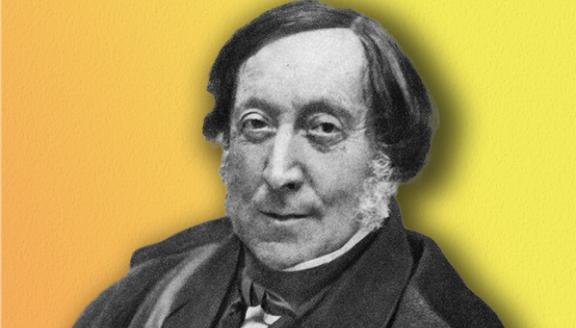

A freedom fighter in Austrian-occupied Switzerland. An oppressive Habsburg governor. The most famous Swiss apple. And a love story that crosses national divides.
Rossini’s thrilling epic, his final masterpiece with the world’s most famous overture, is his most ambitious, forward-looking and vocally challenging opera. Having become the rallying cry of the 1830 revolution in France, Rossini’s final opera is nothing short of revolutionary itself. Retelling the legend of the Swiss folk hero based on Schiller’s play, Guillaume Tell is a grandiose ode to freedom. The story also features another focal point around the love between Arnold, a young Swiss man, and Princess Mathilde of the Habsburgs, and portrays the rich natural beauty of the Alps with superb music. At the final curtain, led from the pit by two harps, the voices of a sublime chorus transcends a story filled with bloodshed. For the first ever original-language production of Guillaume Tell in Japan, New National Theatre Tokyo has entrusted the production and staging to Yannis Kokkos, renowned worldwide as a director and designer. Under the baton of its Artistic Director Kazushi Ono, NNTT has assembled an all-star bel canto cast including Gezim Myshketa in title role, René Barbera as Arnold and Olga Peretyatko as Mathilde.
CAST
|
Guillaume Tell
|
Gezim Myshketa
|
|---|---|
|
Arnold Melchtal
|
René Barbera
|
|
Walter Furst
|
Shingo Sudo
|
|
Melchtal
|
Taiki Tanaka
|
|
Jemmy
|
Yoko Yasui
|
|
Gesler
|
Hidekazu Tsumaya
|
|
Rodolphe
|
Toshiaki Murakami
|
|
Ruodi
|
Yasuhiro Yamamoto
|
|
Leuthold
|
Hiroyuki Narita
|
|
Mathilde
|
Olga Peretyatko
|
|
Hedwige
|
Junko Saito
|
|
Hunter
|
Shoji Sato
|
|
Orchestra
|
Tokyo Philharmonic Orchestra
|
|
Chorus
|
New National Theatre Chorus
|
| ... | |
|
Music
|
Gioachino Rossini
|
|---|---|
|
Text
|
Victor-Joseph Étienne de Jouy
Hippolyte Louis Florent Bis
|
|
Conductor
|
Kazushi Ono
|
|
Production, Sets and Costumes
|
Yannis Kokkos
|
|
Artistic collaboration
|
Anne Blancard
|
|
Lights
|
Vinicio Cheli
|
|
Video
|
Eric Duranteau
|
|
Choreographer
|
Natalie van Parys
|
|
Chorus master
|
Kyohei Tomihira
|
| ... | |
VIDEOS
Story
Act 1
Guillaume Tell laments the oppression of the Swiss by the Habsburgs in the company of his wife Hedwige and his son Jemmy. Their village is preparing three weddings to be officiated by old Melcthal. His son Arnold, a friend of Guillaume Tell, is in love with the Habsburg princess Mathilde, which is irreconcilable with his people’s aspirations for freedom. While the weddings are in full swing, the imperial bailiff and Austrian leader Gesler’s hunting procession can be heard. The shepherd Leuthold hurries ahead, having killed an Austrian soldier who wanted to kidnap his daughter. Tell whisks Leuthold to safety across Lake Lucerne. Arnold has secretly left for his beloved. Rodolphe, leader of Gesler's soldiers, searches the village for Leuthold. Since no one tells him who helped Leuthold to escape, Rodolphe sets the village on fire and arrests old Melcthal.
Act 2
Hunters and herdsmen praise the joys of the Swiss mountains and nature. Mathilde has left the hunt to meet Arnold, they confess their love for each other. As soon as Arnold attains military dignity, he may ask for Mathilde's hand. She withdraws when Tell and the resistance fighter Walter Furst approach. The men inform Arnold that his father, old Melcthal, was killed by the Austrians. They mistrust him because he loves the princess. Arnold is deeply moved and declares his loyalty to the conspirators. Representatives of all Swiss cantons appear, declare Tell their leader and swear the Rütlischwur, which seals their intrepid fight for their freedom.
Act 3
At a castle ruin, Arnold warns Mathilde that despite his feelings for her, he will avenge his father and remain loyal to his country, and refuses to flee with her. They separate in the knowledge that it is a farewell forever. In the village of Altdorf, Gesler stages a celebration of Habsburg sovereignty and orders that all Swiss people should kneel before a statue with his hat on. When Tell and Jemmy refuse, Gesler forces Tell to shoot an apple from his son's head. Tell succeeds in the shot, but when another arrow slips out of his sleeve, he must confess that he would have used it to kill Gesler if he had missed his first target. He is sentenced to death and taken away. Mathilde takes Jemmy with her.
Act 4
Arnold laments Tell's arrest in his hut and calls on his comrades for armed insurrection. Hedwige is desperate and wants to join her family to die with them when Mathilde brings the unharmed Jemmy to her. Jemmy sets the hut on fire, which is the agreed sign of the Swiss to fight. Tell is to be rowed across Lake Lucerne by Gesler and his men for his sentence to be carried out. When fog and a storm come up, Tell's shackles are loosened, because he alone can navigate the boat safely. Shortly before docking, Tell jumps ashore onto a rock and abandons the boat. His wife and son hurry to him and give him his crossbow. Tell sees the burning hut and shoots Gesler, who managed to save himself. Walter and his people appear and rejoice at the oppressor’s death. Arnold and his men also appear and announce the liberation of Altdorf. The Swiss celebrate Tell as their liberator and sing of a new age of peace and freedom.
GALLERY














